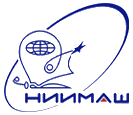FSUE Research and Development Institute of Mechanical Engineering (Russian: ФГУП Научно-исследовательский институт машиностроения), also known as NIIMash, is a Russian rocket engine design and manufacturing company specialized in small thrusters. It is located in the city of Nizhnyaya Salda, Sverdlovsk Oblast. It started as the B-175 factory of the NII-1 research institute, where Mikhail G. Mironov directed the development of liquid rocket engines research and testing.
 | |
Native name | ФГУП «Научно-исследовательский институт машиностроения» |
|---|---|
Romanized name | FSUE “Research and Development Institute of Mechanical Engineering” |
| Formerly | OKB-2 |
| Company type | Federal State Unitary Enterprise |
| Industry |
|
| Predecessor | NII-1 of Moscow |
| Founded | September 1, 1958 in Soviet Union |
| Founder | Mikhail G. Mironov |
| Headquarters | Builders Street 72 (Russian: ул. Строителей, 72), , |
Key people | Anatoly Long, Director of the Institute Adolf I. Razzhigaev Chief Engineer |
| Products | |
| Parent | Roscosmos[1] |
| Website | Official Website |
| Footnotes / references [2][3][4][5] | |
Products
editNIIMash has an extensive experience in design of testing stands, measurement and control as well as certifications. They also have a line of custom built air separation plants. They also have extensive experience in rotational forming of metals. The list of space rated products is extensive and is the following:
Current propulsion products
editEngines in current production:[6][7]
- Propulsion
- Experimental Reactive Control System Module
- KDU 11D414NS
- Fobos-Grunt Sample Return Spacecraft Propulsion System
- Fobos-Grunt Spacecraft Thruster Modules
- Thrusters
- MD5 (a.k.a. RDMT-5): Cold gas thruster.
- MD08 (a.k.a. RDMT-8): Cold gas thrusters used on the Ekspress satellite series.
- MD08-02 (a.k.a. RDMT-8-02): Cold gas thruster: Used on the Fobos-Grunt Sample Return Spacecraft.
- 11D428A-16 (a.k.a. RDMT-135M): 135 N (30 lbf) N2O4/UDMH thruster. Used on the KTDU-80.
- 11D428AF-16: N2O4/UDMH thrusters used by the Fobos-Grunt space mission.
- 11D457: 53.9 N (12.1 lbf) N2O4/UDMH thrusters used by the Resurs-DK No.1.
- 11D457F: 54 N (12 lbf) N2O4/UDMH thrusters used by the Fobos-Grunt space mission.
- 11D458 (a.k.a. RDMT-400): 392 N (88 lbf) N2O4/UDMH thrusters used by the Functional Cargo Block based modules and the Briz upper stage.[8]
- 11D458F (a.k.a. RDMT-400F): 382 N (86 lbf) N2O4/UDMH thrusters used by the Fobos-Grunt space mission.
- 11D458M (a.k.a. RDMT-400M): 392.4 N (88.2 lbf) N2O4/UDMH thrusters used by the Briz-M upper stage.
- 17D16 (a.k.a. RDMT-200K): 200 N (45 lbf) GOX/Kerosene thruster. Used the Buran DO thrusters.
- 17D58E: N2O4/UDMH thrusters used by the Briz-M upper stage.
- 17D58EF: N2O4/UDMH thrusters used by the Fobos-Grunt space mission.
- Experimental thursters
- Propellant tanks & high pressure gas vessels
- Composite high pressure Xenon storage tank: Xenon storage unit for electric propulsion spacecraft.
- Composite Vessel: General high pressure vessel used on the Fobos-Grunt mission.
- Monopropellant Tank with Stiff-Plastic Separation Device (Diaphragm): Monopropellant storage unit used on the Fobos-Grunt mission.
- Bipropellant Tank with Stiff-Plastic Separation Devices (Diaphragms): Bipropellant storage unit used on communications satellites.
- Solenoid Valves
- RT.200:
- 18RT.200:
- 16RT.200:
- 12RT.200:
- 6RT.200:
- Flow stabilizers
- CP1: 2.43 g (0.086 oz) per second of hypergolic propellant flow.
- CP2: 23.5 g (0.83 oz) per second of hypergolic propellant flow.
- CP3: 63 g (2.2 oz)/87 g (3.1 oz)/345 g (12.2 oz)/470 g (17 oz) per second of hypergolic propellant flow.
- CP4: 60 g (2.1 oz) per second of air/nitrogen/oxygen/hydrogen flow.
Former Propulsion Products
editEngines that are no longer produced.[9]
- RDMT-0.4X: N2O4/UDMH rocket engine.
- RDMT-0.8: Nitrogen and helium cold gas thruster.
- RDMT-12: N2O4/UDMH rocket engine.
- RDMT-50: N2O4/UDMH rocket engine.
- RDMT-100: N2O4/UDMH rocket engine.
- RDMT-135 (a.k.a. 11D428A): 135 N (30 lbf) N2O4/UDMH rocket engine. Used on the Soyuz 7K-S, KTDU-426 and initial KTDU-80.
- RDMT-200: 200 N (45 lbf) N2O4/UDMH thruster used on the Almaz space stations.[10]
- RDMT-400A: Experimental version of the RDMT-200 with Niobium combustion chamber.[11]
- RDMT-400X: Experimental version of the RDMT-200 with Carbon combustion chamber.[12]
See also
edit- NII-1 — The research institute where NIIMash started.
- Russian Federal Space Agency — The corporate parent of KB KhIMMASH.
References
edit- ^ "О мерах по созданию Государственной корпорации по космической деятельности "Роскосмос"". Официальный интернет-портал правовой информации. Retrieved 15 April 2017.
- ^ "История" [History] (in Russian). Keldysh Research Center. Retrieved 2015-07-30.
- ^ "История" [History] (in Russian). NIIMash. Retrieved 2015-07-30.
- ^ "Руководители" [Leaders] (in Russian). NIIMash. Retrieved 2015-07-30.
- ^ "Находящиеся в ведении Роскосмоса" [Administered by the Russian Federal Space Agency] (in Russian). Roscosmos. Retrieved 2015-07-30.
- ^ "Двигатели 1944-2000: Аавиационные, Ракетные, Морские, Промышленные" [Aviadvigatel 19442-2000: Aviation, rocketry, naval and industry] (PDF) (in Russian). pp. 140–144. Retrieved 2015-07-25.
- ^ "Products". NIIMash. Retrieved 2015-07-30.
- ^ "RDMT-400". Encyclopedia Astronautica. Retrieved 2015-07-30.
- ^ "NII Mash". Encyclopedia Astronautica. Archived from the original on September 18, 2010. Retrieved 2015-07-30.
- ^ "RDMT-200". Encyclopedia Astronautica. Archived from the original on May 6, 2002. Retrieved 2015-07-30.
- ^ "RDMT-400A". Encyclopedia Astronautica. Archived from the original on May 6, 2002. Retrieved 2015-07-30.
- ^ "RDMT-400X". Encyclopedia Astronautica. Retrieved 2023-01-19.